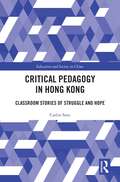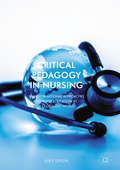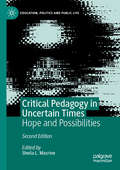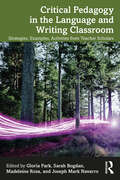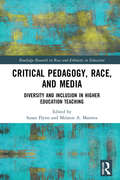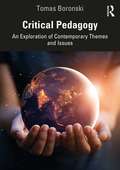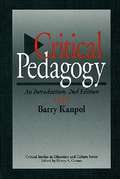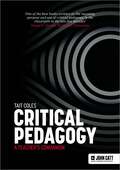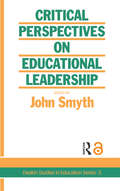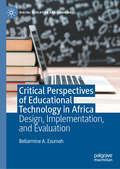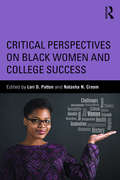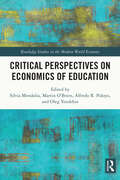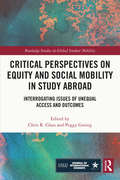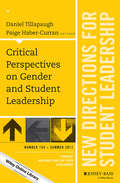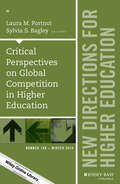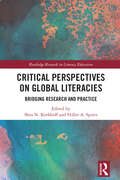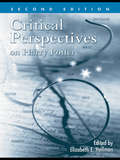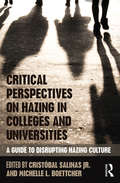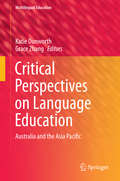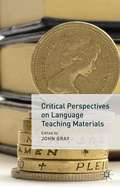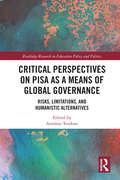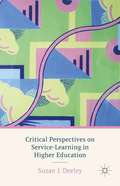- Table View
- List View
Critical Pedagogy in Hong Kong: Classroom Stories of Struggle and Hope (Education and Society in China)
by Carlos SotoThis book chronicles the author’s application of critical pedagogy in Hong Kong secondary schools serving students from working-class families of South Asian heritage, so-called ‘ethnic minorities’ in the local context. Soto used concepts such as banking pedagogy, generative themes, liberatory dialogue, and transformative resistance, to first understand students’ school, online, and community experiences, and then to reshape his teaching of English and humanities subjects to address the students’ academic, social, and emotional needs. This critical ethnography is set against educational reforms in Hong Kong, which re-orientated schools towards developing a knowledge-economy workforce, increased privatization and competition in the school system, aimed to build national identification with China, and sought to address growing inequality in a territory known for wealth disparity. While these reforms opened opportunities for implementing student-centered pedagogies in schools and increased student access to tertiary education, ethnic minority youth faced ongoing economic and social marginalization on top of academic difficulties. The central narrative captures everyday struggles and contradictions arising from intersections of neoliberal reforms, institutional school histories, students’ transnational realities, and collective efforts for equity and social justice. In the course of the book a parallel story unfolds, as the author explores what it means to be a critical teacher and researcher, and is reborn in the process. The book’s ‘on the ground’ story is hopeful, yet tempered, in discussing the limits and possibilities for critical pedagogy. It will be of a great resource for researchers, teacher educators, and pre-service and in-service teachers who are interested in the topic.
Critical Pedagogy in Nursing: Transformational Approaches to Nurse Education in a Globalized World
by Sue DysonThis book explores the academic processes of nursing education in times of uncertainty around healthcare policy and healthcare provision. Grounded in research examining current theory, policy and culture around nursing pedagogy, Sue Dyson addresses the core issues facing nurses today and argues that the current curriculum no longer reflects or serves contemporary nursing practice. In a time of scandals, cuts in funding and shortfalls in the profession, this book provides an answer to the growing call for a dynamic restructuring of nurse education. Offering a critical analysis of innovative pedagogies for nursing, the author proposes the notion of the co-created curriculum as a way forward for nurse education in the post-Francis era. This will be an invaluable read to academics, practitioners and policy makers in the fields of nursing, medicine, education, education policy and medical sociology.
Critical Pedagogy in Uncertain Times
by Sheila L. MacrineThis book brings together the most important figures in the evolution of Critical Pedagogy to provide comprehensive analyses of issues related to the struggle against the forces of neoliberalism and the imperial-induced privatization, not just in education, but in all of social life through the radical democratizing forces of critical pedagogy.
Critical Pedagogy in Uncertain Times: Hope And Possibilities (Education, Politics And Public Life Series)
by Sheila L. MacrineThis edited volume, now in its second edition, brings together the some of the most important figures in the evolution of Critical Pedagogy and a number of up-and-coming scholars. Together they provide comprehensive analyses related to the struggles against the triangulation of Neoliberalism, Conservatism, and Nationalism, not just in education but in all of social life, through the democratizing forces of critical pedagogy. Its re-release coincides with the 50th anniversary of the publication of Paulo Freire’s landmark publication, Pedagogy of the Oppressed. The second edition has been updated with a majority of new chapters to address the current political shifts that have hastened erosion of the public sphere and public education today. These critical pedagogues show how neoliberal attacks can be collectively resisted, challenged, and eradicated especially by those of us teaching in schools and universities.
Critical Pedagogy in Uncertain Times: Hope and Possibilities (Education, Politics and Public Life)
by Sheila L. MacrineThis edited volume, now in its second edition, brings together the some of the most important figures in the evolution of Critical Pedagogy and a number of up-and-coming scholars. Together they provide comprehensive analyses related to the struggles against the triangulation of Neoliberalism, Conservatism, and Nationalism, not just in education but in all of social life, through the democratizing forces of critical pedagogy. Its re-release coincides with the 50th anniversary of the publication of Paulo Freire’s landmark publication, Pedagogy of the Oppressed. The second edition has been updated with a majority of new chapters to address the current political shifts that have hastened erosion of the public sphere and public education today. These critical pedagogues show how neoliberal attacks can be collectively resisted, challenged, and eradicated especially by those of us teaching in schools and universities.
Critical Pedagogy in the Language and Writing Classroom: Strategies, Examples, Activities from Teacher Scholars
by Gloria Park Sarah Bogdan Madeleine Rosa Joseph Mark NavarroThis volume introduces theory-to-practice-based critical pedagogy grounded in Paulo Freire’s scholarship to language and literacy learning settings. The chapters present authentic experiences of teacher-scholars, feature real-world examples and activities ready for implementation in the classroom, and provide nuanced guidance for future teachers. The examples and activities from teacher-scholars place critical pedagogy at the heart of classroom contexts and cover key topics, including place-based pedagogy, contemplative pedagogy, technology within the classroom, and translingual and multimodal paradigms. The chapters include further readings and discussion questions that challenge assumptions and promote deeper reflection, and can be modified for different teaching contexts. This practical volume is essential reading for students and scholars in TESOL and critical pedagogy.
Critical Pedagogy, Race, and Media: Diversity and Inclusion in Higher Education Teaching (Routledge Research in Race and Ethnicity in Education)
by Susan Flynn Melanie A. MarottaCritical Pedagogy, Race, and Media investigates how popular media offers the potential to radicalise what and how we teach for inclusivity. Bringing together established scholars in the areas of race and pedagogy, this collection offers a unique approach to critical pedagogy by analysing current and historical iterations of race onscreen. The book forms theoretical and methodological bridges between the disciplinary fields of pedagogy, equality studies, and screen studies to explore how we might engage in and critique screen culture for teaching about race. It employs Critical Race Theory and paradigmatic frameworks to address some of the social crises in Higher Education classrooms, forging new understandings of how notions of race are buttressed by popular media. The chapters draw on popular media as a tool to explore the social, economic, and cultural dimensions of racial injustice and are grouped by Black studies, migration studies, Indigenous studies, Latinx studies, and Asian studies. Each chapter addresses diversity and the necessity for teaching to include visual media which is reflective of a myriad of students’ experiences. Offering opportunities for using popular media to teach for inclusion in Higher Education, this critical and timely book will be highly relevant for academics, scholars, and students across interdisciplinary fields such as pedagogy, human geography, sociology, cultural studies, media studies, and equality studies.
Critical Pedagogy: An Exploration of Contemporary Themes and Issues
by Tomas BoronskiThis accessible text provides a clear overview of the contemporary themes and challenges within critical pedagogy, and suggests a path towards a more conscientious world for all through education. Boronski encourages us to imagine radical alternatives to current approaches, not merely for ideological reasons, but due to increasing necessity for environmental and sociological perspectives. With case studies, discussion tasks and exemplars from global history woven throughout, each chapter considers a prominent societal and educational issue, tackling some difficult and unsettling areas. Embedded in this exploration is an understanding and application of key concepts, such as justice, equality, rights and power, and how these relate to a range of topics in UK schooling. These include the role of teachers in an age of hyper surveillance and performance monitoring, alternative approaches to education, and the growing fear of the ‘other’. Essential reading for Education Studies students at undergraduate and Master’s level, this comprehensive text will also be of interest to students of Social Policy, Sociology and Politics programmes.
Critical Pedagogy: An Introduction (2nd Edition) (Critical Studies in Education and Culture Series)
by Barry KanpolCritical pedagogy refers to the means and methods of testing and attempting to change the structures of schools that allow inequities. It is a cultural-political tool that takes seriously the notion of human differences, particularly those related to race, class, and gender. Critical pedagogy seeks to release the oppressed and unite people in a shared language of critique, struggle, and hope, to end various forms of human suffering. In this revised edition, Kanpol takes the pre- and in-service educators along some initial steps to becoming critical pedagogists. As before, university professors and public school teachers alike will learn how to address their own prophetic commitments to belief and faith in the fight against despair, institutional chaos, oppression, death of spirit, and exile.
Critical Pedagogy: a teacher's companion
by Tait ColesCritical pedagogy is a transformative approach to education, moving beyond a simple transmission model of teaching where the teacher imparts predetermined knowledge to students. This participatory and empowering pedagogy can ensure classrooms become places of opportunity. Students are encouraged to critique their world and develop the essential attributes needed to become consciously aware, politically knowledgeable and socially responsible.Critical Pedagogy: a teacher's companion provides a refreshing perspective on English secondary education and discusses why critical pedagogy is more essential than ever for our marginalised and oppressed students. Realistic, pragmatic and sensitive suggestions enable the school leader and classroom teacher to consider critical pedagogy as an ongoing responsive, moral and political endeavour to fight social injustice. This book is a must-read for all those who value education as the practice of freedom and emancipation.
Critical Pedagogy: a teacher's companion
by Tait ColesCritical pedagogy is a transformative approach to education, moving beyond a simple transmission model of teaching where the teacher imparts predetermined knowledge to students. This participatory and empowering pedagogy can ensure classrooms become places of opportunity. Students are encouraged to critique their world and develop the essential attributes needed to become consciously aware, politically knowledgeable and socially responsible.Critical Pedagogy: a teacher's companion provides a refreshing perspective on English secondary education and discusses why critical pedagogy is more essential than ever for our marginalised and oppressed students. Realistic, pragmatic and sensitive suggestions enable the school leader and classroom teacher to consider critical pedagogy as an ongoing responsive, moral and political endeavour to fight social injustice. This book is a must-read for all those who value education as the practice of freedom and emancipation.
Critical Perspectives On Educational Leadership
by John SmythFirst Published in 1989. Routledge is an imprint of Taylor & Francis, an informa company.
Critical Perspectives of Educational Technology in Africa: Design, Implementation, and Evaluation (Digital Education and Learning)
by Bellarmine A. EzumahThis book is a critical-cultural evaluation of educational technology adoption in Sub-Saharan Africa, including projects such as the OLPC (One Laptop Per Child). It presents efficient ways of improving education delivery among low-income communities through designing and implementing congruent educational technologies that incorporate social and cultural proclivities. Ezumah defines technology with regards to pedagogy, and seeks to debunk the assumption that educational technology consists only of digital and interactive options. Additionally, she argues for a narrative paradigm shift aimed at validating analog technologies as equally capable of providing necessary and desired educational objectives and outcomes for communities who cannot afford the digital alternatives. By comparing African educational systems in precolonial, colonial, and post-colonial times and incorporating the history of technology transfers from the Global North to South, the book highlights cultural imperialism, development theory, neocolonialism, and hegemonic tendencies.
Critical Perspectives on Black Women and College Success
by Lori D. Patton Natasha N. CroomIn this comprehensive volume, research-based chapters examine the experiences that have shaped college life for Black undergraduate women, and invite readers to grapple with the current myths and definitions that are shaping the discourses surrounding them. Chapter authors ask valuable questions that are critical for advancing the participation and success of Black women in higher education settings and also provide actionable recommendations to enhance their educational success. Perspectives about Black undergraduate women from various facets of the higher education spectrum are included, sharing their experiences in academic and social settings, issues of identity, intersectionality, and the services and support systems that contribute to their success in college, and beyond. Presenting comprehensive, theoretically grounded, and thought-provoking scholarship, Critical Perspectives on Black Women and College Success is a definitive resource for scholarship and research on Black undergraduate women.
Critical Perspectives on Economics of Education (Routledge Studies in the Modern World Economy)
by Silvia Mendolia, Martin O’Brien, Alfredo R. Paloyo, and Oleg YerokhinThis book brings together leading scholars in the field to provide insights on economics of education. The book begins with an overview of education and human capacity development and looks at the production of education through individuals’ learning, education financing and the role of individual circumstances. It also analyses the complex relationship between education and mobility and highlights what key challenges for education systems in a global world are. Each chapter provides detailed analysis of interesting and policy relevant topics in the fields of education economics and human capacity development. This book is a useful reference for those who wish to understand the changing landscape and models of higher education in the context of digital advances and innovation. It will also be of interest to those in the areas of education and training.
Critical Perspectives on Equity and Social Mobility in Study Abroad: Interrogating Issues of Unequal Access and Outcomes (Routledge Studies in Global Student Mobility)
by Chris R. Glass Peggy GesingThis edited volume brings together the perspectives of a diverse group of international scholars to explore the intersections of study abroad and social mobility. In doing so, it challenges universalist assumptions and power imbalances implicit in study abroad across the Global North and South, and explores the implications of COVID-19 for equity within study abroad programs, policy, and practice going forward. Offering empirical, theoretical, and conceptual contributions, Critical Perspectives on Equity and Social Mobility in Study Abroad foregrounds critical reflection on the stratification of access to study abroad and examines the varied outcomes of international study in relation to graduates’ entry into domestic and international labor markets. Focusing on the experiences and outcomes of students from varied backgrounds, chapters identify a number of power imbalances relating to student race, ethnicity, religion, local and international policies and politics, and put forward valuable recommendations to ensure greater equity within the field. Against the backdrop of growing criticism over the power imbalances in international exchange, this text will benefit researchers, academics, and educators with an interest in higher education, international and comparative education, and multicultural education. Those interested in educational policy and the sociology of education more broadly will also benefit from this book.
Critical Perspectives on Gender and Student Leadership: New Directions for Student Leadership, Number 154 (J-B SL Single Issue Student Leadership)
by Paige Haber-Curran Daniel TillapaughHow do students’ social identities, particularly their gender, influence their leadership practices and development? Using Kimberlé Crenshaw’s concept of intersectionality as a framework, this volume discusses existing and emergent research on gender and leadership and offers key strategies and on how leadership educators can engage students in these topics and provide contemporary critical thinking on how gender and leadership inform one another.This volume examines: the ways intersectionality can be used as a lens for gender and leadership, key considerations for developing and advancing leadership among women, men, and trans* students, programs and experiences grounded in critical self-reflection and leadership learning among students of all genders, and opportunities for leadership educators to navigate topics of gender and leadership, emphasizing their own self-work and avenues for affecting positive change. Contributing scholars share examples that are developmentally appropriate for high school and college students. This work is designed with leadership educators in mind, emphasizing theory into practice and highlighting the ways that leadership and gender can promote holistic, transformative learning for all students.The Jossey-Bass quarterly report series New Directions for Student Leadership explores leadership concepts and pedagogical topics of interest to high school and college leadership educators. Issues are grounded in scholarship and feature practical applications and best practices in youth and adult leadership education.
Critical Perspectives on Global Competition in Higher Education: New Directions for Higher Education, Number 168 (J-B HE Single Issue Higher Education)
by Laura M. Portnoi Sylvia S. BagleyThis volume delivers a cutting-edge analysis on vernacular globalization, or how local forces mediate global trends. It delves into the vital facets of the quest for global competitiveness, including: Global university rankings World-class universities University mergers Quality assurance Cross-border higher education International education hubs. The authors situate their topics within current international scholarship and demonstrate the myriad avenues through which local actors in higher education may respond to global competition. They pose critical questions about the impact of global competition in an increasingly hierarchical higher education environment, interrogating the potential for social injustice that arises. By providing an alternative perspective to the descriptive, normative approach that dominates the scholarship on global competition in higher education, the chapters in this volume open a fresh and invaluable dialogue in this arena.This is the 168th volume of the Jossey-Bass quarterly report series New Directions for Higher Education. Addressed to presidents, vice presidents, deans, and other higher education decision makers on all kinds of campuses, it provides timely information and authoritative advice about major issues and administrative problems confronting every institution.
Critical Perspectives on Global Literacies: Bridging Research and Practice (Routledge Research in Literacy Education)
by Shea N. Kerkhoff Hiller A. SpiresThis book offers critical perspectives on global literacies, connecting research, theory, and practice. An emerging concept in the literacy field, many scholars agree on the need for students to develop global literacies, yet few agree on a widely accepted definition. Based on a synthesis of the literature, the editors formulate a definition of global literacies with four dimensions, including: literacy as a human right in all nations around the world; critical reading and creation of multimodal texts about global issues; intercultural communication and reciprocal collaboration with globally diverse others; and transformative action for social and environmental justice that traverses borders. Taking this shared, proposed definition as a starting point, the chapters then offer contextualized examples of global literacies from K-12 and teacher education classrooms to make explicit links between research and practice. The contributors interact with and interrogate the book’s definition of global literacies using a common framework of critical theory. As such, this book provides both emerging and established scholars with critical frameworks for positioning global literacies in ways that are relevant, dynamic, and forward thinking.
Critical Perspectives on Harry Potter
by Elizabeth E. HeilmanThis thoroughly revised edition includes updated essays on cultural themes and literary analysis, and its new essays analyze the full scope of the seven-book series as both pop cultural phenomenon and as a set of literary texts. Critical Perspectives on Harry Potter, Second Edition draws on a wider range of intellectual traditions to explore the texts, including moral-theological analysis, psychoanalytic perspectives, and philosophy of technology. The Harry Potter novels engage the social, cultural, and psychological preoccupations of our times, and Critical Perspectives on Harry Potter, Second Edition examines these worlds of consciousness and culture, ultimately revealing how modern anxieties and fixations are reflected in these powerful texts. ("DISCLAIMER: This book is not authorized, approved, licensed, or endorsed by J.K. Rowling, Warner Bros. Entertainment Inc., or anyone associated with the Harry Potter books or movies.")
Critical Perspectives on Hazing in Colleges and Universities: A Guide to Disrupting Hazing Culture
by Cristóbal Salinas Jr. Michelle L. BoettcherThis important resource explores the political, cultural, and historical context of hazing at colleges and universities, and also highlights the diverse settings where hazing occurs on campus. Grounded in empirical practice and research, chapter authors discuss current hazing policies and implications to student success while challenging dangerous and harmful hazing habits. Unpacking common myths, this volume helps higher education and student affairs practitioners understand the implications of policy while providing best practices and practical tools for fostering safe and productive organizations on campus. Critical Perspectives on Hazing in Colleges and Universities helps readers continue to educate themselves in prevention while advocating for the lives of people affected by or vulnerable to hazing.
Critical Perspectives on Language Education: Australia and the Asia Pacific (Multilingual Education #11)
by Katie Dunworth Grace ZhangThe studies in this volume investigate how multilingual education involves a critical engagement with questions of identity and culture, and a movement towards new ways of being and belonging. It addresses previously under-explored issues, in particular the integration of theories like 'thirdness', and practices of language education and maintenance with relevance to the Asia-Pacific region. The analyses reveal the delicate balance of interests of all stakeholders and offer detailed insights into the reality of multilingual education, with specific examples of Chinese, English, Japanese and Tamil. In a globalised world, effective language education has become increasingly important, and the studies presented here have the potential to inform and advance evidence-based multilingual education through adding important dimensions of theoretical exploration and refreshing empirical resources.
Critical Perspectives on Language Teaching Materials
by John GrayThis Critical Perspectives on Language Teaching Materials brings together a collection of critical voices on the subject of language teaching materials for use in English, French, Spanish, German and Content and Language Integrated Learning (CLIL) classrooms.
Critical Perspectives on PISA as a Means of Global Governance: Risks, Limitations, and Humanistic Alternatives (Routledge Research in Education Policy and Politics)
by António TeodoroThis volume offers a critical examination of the Programme for International Students Assessment (PISA), focusing on its origins and implementation, relationship to other international large-scale assessments, and its impacts on educational policy and reform at national and cross-national levels. Using empirical data gathered from a research project carried out by the CeiED at Lusophone University, Lisbon, the text highlights connections between PISA and emergent issues including the international circulation of big science, expertise, and policy, and identifies its conceptual and methodological limits as a global governance project. The volume ultimately provides a novel framework for understanding how OECD priorities are manifested through a regulatory instrument based in Human and Knowledge Capital Theory, and so makes a powerful case to search for new humanistic approaches. This text will benefit researchers, academics, and educators with an interest in education policy and politics, international and comparative education, and the sociology of education more broadly. Those interested in the history of education will also benefit from this volume.
Critical Perspectives on Service-Learning in Higher Education
by Susan J. DeeleyThrough innovative analysis of theory and practice, this book offers refreshing critical perspectives on service-learning in higher education. It constructs a theoretical paradigm for service-learning which extends to critical pedagogy, and investigates critical reflection and academic reflective writing, supported throughout by empirical evidence.
